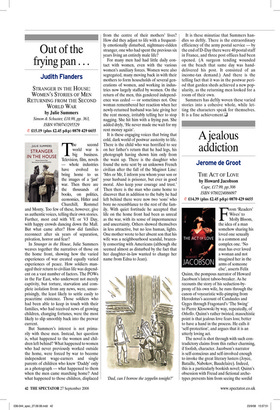Out of the frying pan . . .
Judith Flanders
STRANGER IN THE HOUSE: WOMEN’S STORIES OF MEN RETURNING FROM THE SECOND WORLD WAR by Julie Summers Simon & Schuster, £18.99, pp. 363, ISBN 9780743295529 ✆ £15.19 (plus £2.45 p&p) 0870 429 6655 The second world war is big business. Television, film, novels — whole industries have evolved to bring home to us the images of a ‘just’ war. Then there are the thousands of books, on politics, economics, Hitler and Churchill, Rommel and Monty. Too few of these, however, give us authentic voices, telling their own stories. Further, most end with VE or VJ Day, with happy crowds dancing down the Mall. But what came after? How did families reconnect after six years of separation, privation, horror and fear?
In Stranger in the House, Julie Summers weaves together the narratives of those on the home front, showing how the varied experiences of war created equally varied experiences of peace. How soldiers managed their return to civilian life was dependent on a vast number of factors. The POWs in the Far East, who underwent not merely captivity, but torture, starvation and complete isolation from any news, were, unsurprisingly, the least likely to settle easily to peacetime existence. Those soldiers who had been able to keep in touch with their families, who had received news of growing children, changing fortunes, were the most likely to slip smoothly back into the prewar current.
But Summers’s interest is not primarily with these men. Instead, her question is, what happened to the women and children left behind? What happened to women who had never previously worked outside the home, were forced by war to become independent wage-earners and single parents of children who knew ‘Daddy’ only as a photograph — what happened to them when the men came marching home? And what happened to those children, displaced from the centre of their mothers’ lives? How did they adjust to life with a frequently emotionally disturbed, nightmare-ridden stranger, one who had spent the previous six years living an entirely male life?
For many men had had little daily contact with women, even with the various women’s auxiliary forces. Women were also segregated, many moving back in with their mothers to form households of several generations of women, and working in industries now largely staffed by women. On the return of the men, this gendered independence was ceded — or sometimes not. One woman remembered her reaction when her newly-returned husband was late giving her the rent money, irritably telling her to stop nagging. She hit him with a frying pan. She added dryly, ‘He never made me wait for my rent money again’.
It is these engaging voices that bring that cold, dark world of postwar austerity to life. There is the child who was horrified to see on her father’s return that he had legs, his photograph having shown him only from the waist up. There is the daughter who found the note sent by an unknown French civilian after the fall of the Maginot Line: ‘Mrs or Mr, I inform you whom your son or your husband is prisoner, but ever in good moral. Also keep your courage and trust.’ Then there is the man who came home to discover that in addition to the baby he had left behind there were now two ‘sons’ who bore no resemblance to the rest of the family. With quiet fortitude he accepted that life on the home front had been as unreal as the war, with its sense of impermanence and uncertainty. Others showed themselves in less attractive, but no less human, lights. One mother wrote to her absent son that his wife was a neighbourhood scandal, brazenly consorting with Americans (although she seemed almost as disturbed by the fact that her daughter-in-law wanted to change her name from Edna to Jean). It is these minutiae that Summers handles so deftly. There is the extraordinary efficiency of the army postal service — by the end of D-Day there were 40 postal staff in France, and three post offices had been opened. (A surgeon tending wounded on the beach that same day was handdelivered his post. It consisted of an income-tax demand.) And there is the telling fact that it was in the postwar period that garden sheds achieved a new popularity, as the returning men looked for a room of their own.
Summers has deftly woven these varied stories into a cohesive whole, while letting the characters speak for themselves. It is a fine achievement.q










































































 Previous page
Previous page